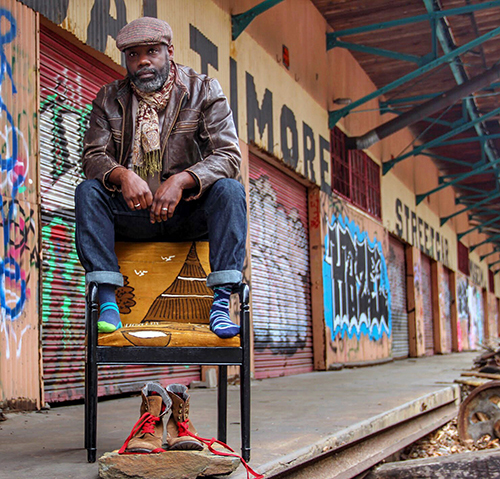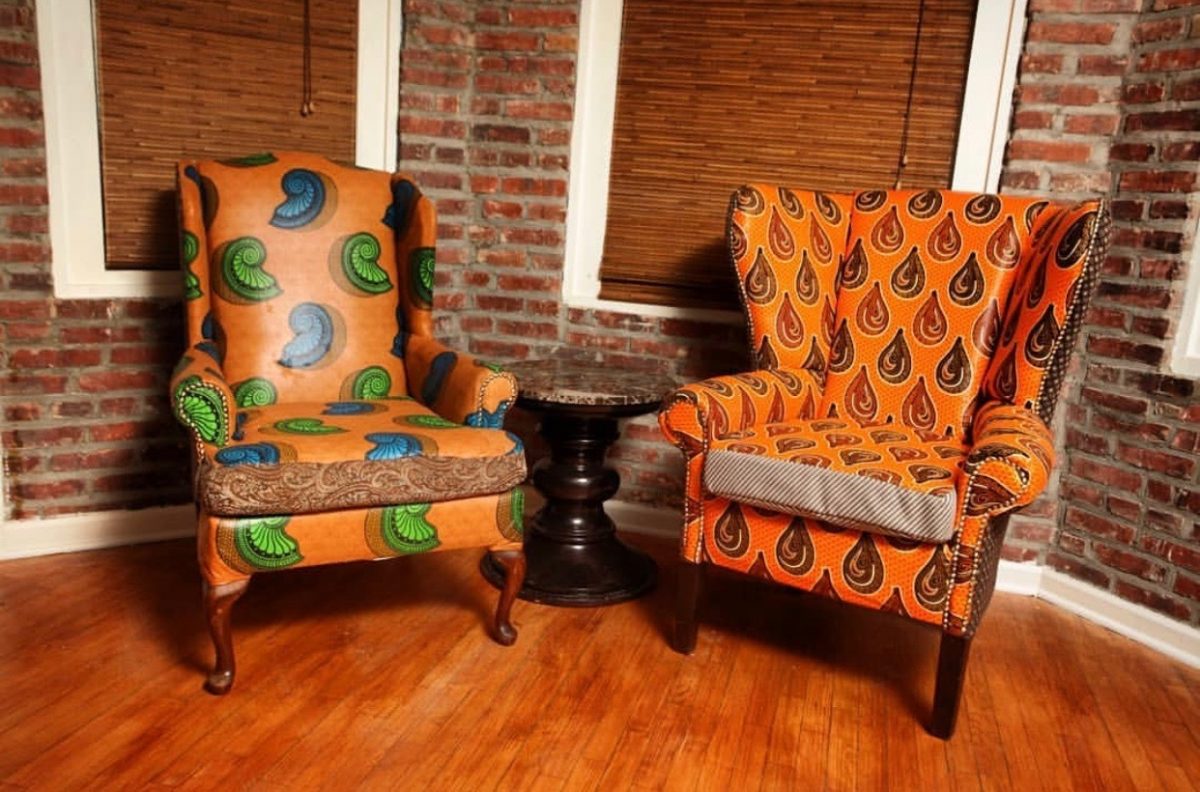
As a consummate storyteller, Devlon Waddell’s mediums range from memoirs to mudcloth, as he stands on stages and also stages beautiful spaces. The founder of furniture company Knot You Vintage, Wadell works out of his home studio to create one-of-a-kind furniture from repurposed fabrics and uses those functional art pieces as a way to tell stories up and down the East Coast.
Your life’s work has been about storytelling. How did you get the point where you began telling stories through designing furniture?
What I have found in learning that I was creative only about 10 or 15 years ago, is that I do the things and then I backtrack and figure out why. Find that narrative thread that led me to wherever I am. So, with the furniture, it was about opening a vintage clothing shop and instead of doing the traditional retail fixtures I was like, ‘Why not buy old stuff and make it suit my need?’ It started with bookcases and a couple of chairs and my wife, who works in public health, would get fabric from programming folk who worked in places like Tanzania, Nigeria, Egypt, and I am like, ‘Well, I have this, what can I do with it? Let me put it on furniture.’
In terms of the storytelling, I guess the idea that the pieces tell me when they are done or ‘right’ is what leads me to believe it’s about the story because several pieces of furniture will have four or five iterations so I will have posted a piece fully and then feel that something isn’t right about it, strip it down, and do it again. I am not sure what the bigger story I am telling is. It may be as organic as the right person for this piece of furniture is out there and the universe is telling me that I haven’t created what that person needs.

You are commissioned to do work for some of the most talented and powerful people in Baltimore. Tell me the most interesting story you have come across when designing for someone’s home.
What is interesting to me is the deals that don’t happen. There are often conversations, sometimes they get very specific, sometimes they get to the point of invoices being generated and they just don’t pan out. The conversations are hilarious because it’s all about ‘supporting artists’ and ‘supporting black business’ and doing all of those things to edify community. But when it comes down to brass tacks, folks don’t want to come off the bread—and that’s fine. I am not one who believes that everyone has to have my work.
I do believe sincerely that, if you do work with me, you will get an experience that is broader than just a piece of furniture being delivered. But the idea that folks somehow feel like they are doing me a favor by some superficial engagement that doesn’t result in the business being done is just fascinating to me. Everybody likes to be affirmed. Everybody likes the ‘like’ button on social media but when it comes down to it, what business is happening? You know, folks talk about ‘support black business.’ I’m all about doing business with black business.
Your main demographic is people of color. Is that because you are located in a 64-percent black city?
So, my best client in terms of dollars and cents and also giving me a certain freedom is not a person of color. This is interesting because I am unapologetically black and I have no qualms about expressing that, but my goal is to work with people who appreciate, truly, what I do and the effort that I put into making things for them as individuals. Wherever you land on the racial spectrum matters little when you are authentic and you understand what I do.
Do I enjoy working with black folk? Yes, because I understand throughout the different iterations of my creative career that there are things that need to exchange broader than the tangible. There are energies that need to be exchanged more between black folk just because of the trauma we suffer specifically in this city, because this is where I am from. I think a big part of my work in that storytelling or that narrative approach is about making connections toward deeper understanding and general healing.
Are you operating in your full power and capitalizing on your capacity in the stage you are in now with your art and your entrepreneurship?
Absolutely not. One, in terms of entrepreneurship, it is challenging for me given my personal demons to give myself the credit to take myself seriously enough. Until I can work from a place of ‘yes,’ will not be operating at capacity. I am getting better. Am I getting better at a rate that satisfies me? Not necessarily, but there is growth. Creatively? I believe that if you feel like you are working at capacity creatively not only are you not growing, you are regressing. I feel like you should always be pushing yourself to do more, to do better.
Where would you like to see yourself in 10 years?
I would love to be able to say, ‘being a designer of things.’ Maybe having a shop, maybe having multiple shops, but designing the furniture and not having to do the work. In 10 years, I want to embrace the fact that I am not only a storyteller in the things that I do but also in the most literal sense, being on stages and sharing my stories.
